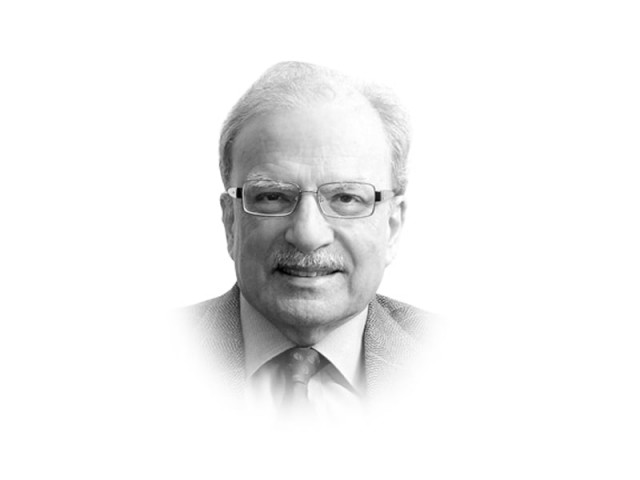Backwardness of the Muslim world
Many in the Muslim world, alienated with their environment, are choosing the “exit” option

The writer is a former caretaker finance minister and served as vice-president at the World Bank
Daron Acemoglu and James Robinson, two Boston-based social science professors, explained at some length the question in the title of their book, Why Nations Fail. They argue that unless countries have inclusive systems of governance, they will not be able to achieve stability. Decades earlier, Albert O. Hirschman, the Harvard economist, suggested that unhappy people look for essentially three options. He listed these options in the title of his book, Exit, Voice and Loyalty.
Many in the Muslim world, alienated with their environment, are choosing the “exit” option, which is taking different forms. They range from the Arab Spring approach, in which the youth attempted to open their political systems, to joining extremist groups, such as the Islamic State in Iraq and Syria. In more developed political systems, the alienated use the “voice” option, deploying the forums provided by elected bodies to air their concerns and require that action be taken by way of public policy to allay them.
The western part of the Muslim world has mostly failed to create political systems that would lay the ground for stability. I define this part of the world to include the stretch of land from Morocco in the west to Bangladesh in the east. It is home to some 1.2 billion Muslim people with the largest proportion living in South Asia. Of these 33 nations, only three seem to be moving in the direction of achieving stability through political modernisation. But the attempted coup could have taken out one more country, Turkey, which until then, seemed to be going in the right direction.
There are several reasons for the political backwardness of Muslim nations. Among the more important ones are institutional imbalance between the military and political structures, the failure to define the role of Islam in political and economic governance, and the support often provided by the West to authoritarian governments that managed to take control of government institutions. It was usually the military that put a small segment of the population in power. That chain needs to be broken.
The citizens of this area need a role model they can follow. South Asia may provide one model. The fact that two Muslim majority states in this region, Bangladesh and Pakistan, are managing to move towards the establishment of representative political orders is probably influenced by the presence next door of India, a story of political success. But something more is needed than the Indian example. What is required is a Muslim majority country that has succeeded or is succeeding in creating inclusive economic and political structures. But systems that fail to make the transition from authoritarian rule to representative political structures will also influence change in the Muslim world.
There is concern among informed political quarters that Turkey may move in the opposite direction. “It may well be that democracy in Turkey has triumphed only to be strangled at a slower pace,” says Jonathan Eyal, the international director at Britain’s Royal United Services Institute.” While the West gave support to President Reccip Erdogan and his party in their struggle with the military, this was not always the case when backward moves took place in the politically volatile Middle East. When an Egyptian general, Abdel Fattahel Sisi, led a coup three years ago against the democratically elected president, Mohammad Morsi, the head of the Muslim Brotherhood, Washington did not support the democratic government as it has done in Turkey. Then, the policy calculus weighed in favour of lending support to the military. The generals were to be trusted more with Washington’s political preferences in the Middle East than an Islamist political party. “Policy often amounts to choosing the least bad option,” writes Roger Cohen in The New York Times. “The least bad – Erdogan’s survival – has prevailed. That does not mean that much worse won’t follow. A failed coup doesn’t mean democracy is the winner. The worst of this prickly autocrat may now be unleashed upon Turkey, with America and its allies able to do little about it.”
I have said little up to this point about my strong belief that political and economic developments strongly interact with one another, each influencing the other. Causality is not in one direction. Politics influences economics which, in turn, impacts politics. Reasonably well-developed institutions help to keep this interaction within manageable bounds. One reason why the forces that supported Erdogan were able to overcome the attempt by the military to overthrow the elected government was the satisfaction of a large segment of the population with the rewards they had received from the president’s economic policies. The administrations that came before the Erdogan government were narrow-based. They worked for mostly the Europeanised elite of Turkey. The new president and his party stretched their reach to the neglected Anatolian plateau, home to the majority of the Turkish population and relatively less developed than the coastal areas of the country. It is their support that brought Erdogan to power and pushed the military back when it attempted government takeover.
Published in The Express Tribune, July 25th, 2016.
Like Opinion & Editorial on Facebook, follow @ETOpEd on Twitter to receive all updates on all our daily pieces.















COMMENTS
Comments are moderated and generally will be posted if they are on-topic and not abusive.
For more information, please see our Comments FAQ